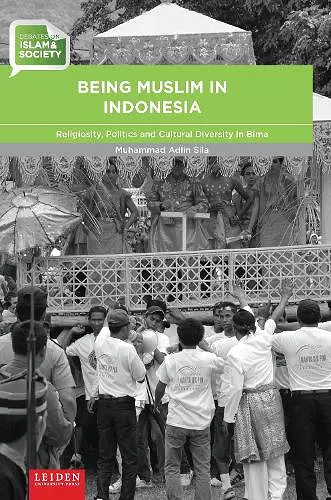Being Muslim in Indonesia
Religiosity, Politics and Cultural Diversity in Bima
Format:Paperback
Publisher:Leiden University Press
Published:6th Mar '21
Currently unavailable, and unfortunately no date known when it will be back

How Muslims in Indonesia consider their religious practices, politics and culture as Islamic is described in this volume. By examining the various ways Bima Muslims constitute their Islamic identities and agencies through rituals and festivals, this book argues that religious practice is still vigorous in present Bima. It explores the reproduction of religious meanings among various local Muslims and the differences between social groups. Islam is represented as divided between the traditionalist Muslims and the reformist Muslims, between the royal family and the ordinary Muslims, and between Muslim clerics and lay people. Consequently, there is no single picture of Islam. As Bima Muslims construe their Islam in response to their surroundings, what it means to be a Muslim is constantly being negotiated. The complexity of religious life has been a result of the duality of socio-political settings in Bima which stems from the early period of the Islamization of Bima to the present.
“I think the work is a valuable book with a wealth of new and as yet unrecorded information on Islam as practiced in Bima, obtained from fieldwork. One of the interesting things it shows is that the commonly accepted dichotomy between traditionalist Muslims (organized in the Nadlatul Ulama) on the one hand and the reformist Muslims (organized in the Muhammadiyah) is not fully tenable and that the boundaries between these two orientations within Islam are actually blurred, e.g. in the sensitive issue of traditional healing. The part on the Hanta Ua Pua Festival shows in an interesting way how religion is linked to the peculiar traditional dual power structure in Bima. All in all, this is the best book on Islam in everyday life in Bima, which I know of.” -- Nico Kaptein, University of Leiden
“This book contains a great deal of material on contemporary expressions of Islam in a part of Indonesia that is famous for its piety. One of the aims of the book is to show how villagers have continued to maintain a large degree of local social cohesion in the performance of a variety of rituals despite the over-arching presence of a global conflict in the Islamic world between traditionalist mysticism and scripturalist rationalism.” -- Thomas Gibson, University of Rochester
“This dissertation provides important ethnographic insights and theoretical arguments that shed light on the relationship between local politics and everyday Islam. With deep historical insights about local and transnational connection to Bima, the author observes how, during a moment of decentralization and regional autonomy, a once-forbidden ritual touting the arrival of Islam to Bima experiences a resurgence. Rather than ascribing this shift to ostensibly Islamic practice, the author argues compellingly that religion must be understood within a wider field of patronage and power relations, notably a clever shift in tactics from a Golkar-era party enthusiast to a post-authoritarian embrace of the power of Bima’s sultanate. This research provides a great contribution to a relative dearth of good ethnography of Muslim life in eastern Indonesia. . . The author has filled an important void in our scholarly understanding about the cultural politics of Islam in eastern Indonesia. This dissertation would likely be well received by scholars of religion, anthropology, and political science, and I look forward to reading the published version.” -- Mark Woodward, University of Boston
ISBN: 9789087283629
Dimensions: unknown
Weight: unknown
250 pages